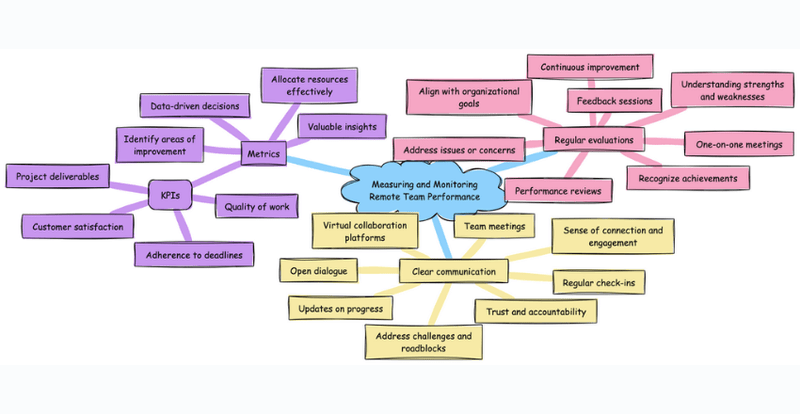Menu
Building and managing remote development teams can be a challenge, as there are various factors to consider. It is important to carefully assess the nature of projects and determine whether a virtual team is suitable, particularly for agile projects that require close collaboration.
Table of Contents
ToggleWhen considering the use of remote development teams, it is crucial to carefully assess the nature of the projects and determine whether a virtual team is suitable, especially for agile projects that require close collaboration. Complex projects or those in industries with strict data security regulations may not be suitable for remote teams.
Assessing the suitability for remote teams involves evaluating factors such as project complexity, communication needs, and the ability to collaborate effectively in a virtual environment.
Complex projects with intricate dependencies and a high degree of inter-team collaboration may face challenges in a remote environment. Agile projects, for example, heavily rely on continuous interaction and feedback among team members. The use of digital tools and platforms that facilitate real-time communication and collaboration is crucial for remote teams engaged in agile projects. On the other hand, projects with well-defined tasks, individual responsibilities, and minimal dependency on collaboration can be more suitable for remote teams.
Effective communication and coordination are essential for remote teams to succeed. Remote team members must be adept at using various communication tools like video conferencing, instant messaging, and project management software to facilitate seamless collaboration. Additionally, a strong team culture that promotes open communication, encourages sharing ideas, and fosters trust is vital for remote teams. Regular team meetings, stand-ups, and check-ins can help ensure that everyone is aligned and aware of project progress.
| Factors to Consider | Suitability for Remote Team |
|---|---|
| Project complexity | Assess the level of collaboration required and dependencies between team members. Determine if remote teams can effectively handle the complexity. |
| Communication needs | Evaluate how critical real-time communication and coordination are for project success. Determine if remote teams can meet these needs using digital tools. |
| Data security regulations | Consider the industry-specific regulations and security requirements. Assess if remote teams can meet these standards and ensure data protection. |
By carefully evaluating the project nature, complexity, and collaboration needs, businesses can determine if a remote development team is the right fit. While some projects may thrive in a remote environment, others may require more in-person interaction and on-site presence. Understanding these factors and making informed decisions can help businesses build successful remote teams.

To ensure the success of a remote development team, it is crucial to hire a competent project manager who can effectively manage the team, maintain customer communication, and deliver value to clients. The project manager plays a crucial role in ensuring that the remote team remains focused and aligned with business goals.
When hiring a project manager for a remote development team, it is important to consider their experience in coding team management and remote team supervision. The project manager should possess strong leadership skills, excellent communication abilities, and a deep understanding of software development processes.
Additionally, the project manager should have a solid track record in coordinating remote teams and fostering effective collaboration. This includes ensuring that all team members are well-coordinated, communicating regularly through appropriate channels, and resolving any conflicts or issues that may arise.
| Skills | Experience | Responsibilities |
|---|---|---|
| Project management | Minimum 5 years | Oversee project planning, execution, and delivery |
| Communication | Excellent written and verbal skills | Maintain regular communication with clients and team members |
| Team management | Proven leadership experience | Manage and motivate remote development team |
| Technical knowledge | Strong understanding of software development | Provide technical guidance and support to the team |
By hiring a competent project manager with a strong background in coding team management and remote team supervision, businesses can ensure effective coordination, seamless communication, and successful delivery of projects in a remote work environment.
When hiring remote developers for a development team, it is essential to evaluate their professional ethics, decision-making capabilities, technical skills, and industry knowledge. Remote developers play a critical role in the success of a remote development team, and thorough evaluation ensures that the team is equipped with the right talent.
One way to assess remote developers is by evaluating their professional ethics. Look for candidates who demonstrate a strong work ethic, reliability, and accountability. Remote developers need to be self-motivated and disciplined, as they work independently and are responsible for meeting deadlines and delivering high-quality work.
Another crucial aspect to consider is their decision-making capabilities. Remote developers should have the ability to make informed decisions and solve problems efficiently. They should be proactive in seeking solutions, adapting to changing requirements, and communicating any challenges or roadblocks they encounter.
| Technical Skills | Industry Knowledge |
|---|---|
| Proficient in programming languages such as Java, Python, or JavaScript. | Stay updated with the latest industry trends and best practices. |
| Experience with relevant frameworks and libraries. | Understand the business domain and specific industry requirements. |
| Familiarity with version control systems like Git. | Knowledge of security protocols and data protection measures. |
In addition to technical skills, remote developers should possess a deep understanding of the industry they are working in. This knowledge ensures that they are aware of industry-specific challenges, standards, and regulations. It also helps them make informed decisions and contribute to the overall success of the team.
Evaluating remote developers based on these criteria will help build a strong and competent remote development team. By assessing their professional ethics, decision-making capabilities, technical skills, and industry knowledge, businesses can ensure that they have the right talent to deliver high-quality work and contribute to the success of the team and the projects they undertake.

Setting up the right systems and structures is crucial for the success of remote development teams, including organizational functions, project management systems, and IT infrastructure. When working remotely, it is important to have clear guidelines and processes in place to ensure effective communication, collaboration, and productivity.
Remote teams need well-defined roles and responsibilities to function smoothly. Clearly defining the roles of team members helps minimize confusion and promotes accountability. It is essential to establish reporting structures, decision-making processes, and workflows to ensure efficient coordination and execution of tasks.
In order to manage projects effectively, remote teams should utilize robust project management systems and tools. These tools aid in task tracking, milestone management, and resource allocation. By centralizing project-related information and providing real-time visibility, these systems help remote teams stay organized and aligned with project goals.
Having a reliable and secure IT infrastructure is critical for remote development teams. It is important to provide team members with the necessary hardware, software, and network connectivity to carry out their tasks. Additionally, implementing suitable security measures, such as encrypted communication channels and secure data storage, helps protect sensitive information.
| Organizational Functions | Project Management Systems and Tools | IT Infrastructure |
|---|---|---|
| Clear roles and responsibilities | Robust project management systems | Reliable hardware and software |
| Reporting structures | Task tracking and milestone management | Secure network connectivity |
| Decision-making processes | Resource allocation | Data security measures |
By establishing these systems and structures for remote teams, businesses can enhance collaboration, streamline project management, and ensure a productive and successful remote work environment.

Remote development teams can achieve success by implementing best practices such as fostering a shared team culture, building trust, and hiring individuals with strong collaboration skills. These practices contribute to the overall connectivity of the team and enhance their ability to work together effectively, regardless of physical distance.
Developing a shared team culture is crucial for remote teams. This involves establishing common values, goals, and norms that guide behavior and decision-making. Encouraging open communication, promoting a sense of belonging, and organizing regular virtual team-building events can help foster this shared culture. By creating a culture of inclusivity and collaboration, remote teams can strengthen their connection and improve overall productivity.
Trust is the foundation of any successful team, and it becomes even more critical in a remote setting. Remote team members must trust that their colleagues will deliver quality work, communicate effectively, and support one another. Building trust can be achieved through consistent actions, transparent communication, and honoring commitments. Regular check-ins, both formal and informal, can also help remote team members feel connected and build trust with one another.
When building a remote team, it is essential to hire individuals who possess strong collaboration skills. These individuals should be able to effectively communicate, actively participate in team discussions, and contribute to a positive team dynamic. Collaborative team members are more likely to engage in problem-solving, share knowledge, and help each other succeed. Including collaboration as a core competency in the hiring process can ensure that the team is composed of individuals who thrive in a remote working environment.
| Best Practices for Remote Teams | |
|---|---|
| Foster a shared team culture | Building a common foundation for remote team members |
| Build trust | Consistency, transparency, and honoring commitments |
| Hire individuals with strong collaboration skills | Effective communication and active participation |
Remote development teams can be structured as generalist, specialist, or hybrid teams, depending on the specific project requirements. Each team structure offers unique advantages and considerations, allowing businesses to build a cohesive and efficient remote workforce.
A generalist team consists of versatile developers who possess a broad range of skills and can handle various tasks within a project. These teams excel in projects that require flexibility and adaptability. However, generalist teams may lack the specialized expertise needed for complex or highly technical projects.
Specialist teams, on the other hand, focus on specific areas of expertise, such as front-end development, database management, or UI/UX design. By leveraging their specialized knowledge and skills, specialist teams can deliver high-quality results in their respective domains. However, they may face challenges when confronted with tasks outside their expertise.
A middle-ground approach is to form a hybrid team, combining the advantages of both generalist and specialist teams. Hybrid teams consist of a diverse range of skill sets, allowing for comprehensive coverage of project requirements. This structure can enhance creativity and provide solutions that leverage both specialized knowledge and versatility. However, effectively managing a hybrid team requires careful coordination and communication to ensure optimal collaboration and project outcomes.
Regardless of the chosen team structure, successful remote development teams prioritize effective communication, collaboration tools, and well-defined processes. By considering project requirements and carefully selecting the appropriate team structure, businesses can build remote development teams that drive innovation, productivity, and success.
| Team Structure | Advantages | Considerations |
|---|---|---|
| Generalist Team | Versatility, adaptability, flexibility | Lack of specialized expertise |
| Specialist Team | Expertise in specific areas, high-quality outputs | Challenges with tasks outside their expertise |
| Hybrid Team | Combination of versatility and specialized knowledge | Requires effective coordination and communication |

Successful onboarding of remote employees involves starting the process early, preparing the existing team, and providing the necessary resources for seamless integration. When bringing new team members aboard, it is essential to create a structured onboarding program that sets clear expectations and facilitates effective collaboration from the start.
Starting the process early: Before the remote employee’s first day, ensure that all necessary paperwork and administrative tasks are completed. This includes setting up access to company systems, providing login credentials, and sharing important documents and policies. By proactively addressing these items, you can ensure a smooth transition and avoid delays in productivity.
Preparing the existing team: A successful onboarding process requires collaboration from both the new employee and the existing team. Encourage team members to welcome the new hire and provide guidance and support during their initial days. Assigning a mentor or buddy can be particularly beneficial, as it allows the new employee to have someone they can turn to for questions or concerns.

Adopting agile methodologies and utilizing project management tools are crucial for remote development teams, as they enhance flexibility, collaboration, and overall productivity. Agile methodologies, such as Scrum or Kanban, provide a framework for iterative and incremental development, allowing teams to adapt quickly to changing requirements and deliver value to customers consistently.
To effectively implement agile practices in remote teams, project management tools play a vital role in facilitating communication, organizing tasks, and tracking progress. These tools enable remote team coordination and supervision by providing a centralized platform for team members to collaborate, share updates, and manage their work effectively. Popular project management tools like Jira, Trello, or Asana offer features like task assignment, progress tracking, and real-time communication, ensuring that all team members are aligned and informed about project status.
Furthermore, project management tools can also enhance remote team supervision by providing transparency into individual and team performance. Managers can easily track metrics, such as task completion rates, velocity, or quality metrics, allowing them to monitor team productivity, identify bottlenecks, and make data-driven decisions. Real-time dashboards and reports generated by project management tools provide visibility into project progress, enabling managers to provide timely feedback, offer support when needed, and ensure that the team stays on track.
Fostering team engagement and motivation in remote development teams can be achieved by setting clear goals, providing growth opportunities, recognizing achievements, and organizing virtual team-building events. Effective goal setting is crucial for remote teams to have a shared understanding of what needs to be accomplished. Clear and measurable goals create a sense of purpose and direction, motivating team members to strive for excellence.
Growth opportunities are essential for remote developers to stay motivated and continuously improve their skills. Providing access to professional development resources, such as online courses or workshops, enables team members to expand their knowledge and expertise. This not only enhances individual growth but also contributes to the overall success of the team.
Recognizing achievements is a powerful way to boost morale and motivate remote developers. Regularly acknowledge and celebrate milestones, completed projects, and exceptional performance. This recognition can be through emails, public acknowledgments during team meetings, or even small rewards to show appreciation for their hard work.
Organizing virtual team-building events is another effective way to foster engagement and build relationships among remote developers. These events can range from online game tournaments, virtual happy hours, or team challenges. Engaging in non-work-related activities helps create a sense of camaraderie and strengthens the bonds within the team.

Measuring and monitoring remote team performance is essential for maintaining productivity and ensuring success. In the virtual work environment, where face-to-face interactions are limited, it becomes crucial to rely on metrics, regular evaluations, and clear communication to effectively assess and manage team performance.
Utilizing metrics provides valuable insights into the team’s progress, productivity, and overall performance. Key performance indicators (KPIs) can be established to measure specific aspects such as project deliverables, quality of work, adherence to deadlines, and customer satisfaction. These metrics allow project managers to identify areas of improvement, allocate resources effectively, and make data-driven decisions to optimize team performance.
Regular evaluations play a vital role in understanding individual and team strengths, weaknesses, and growth opportunities. Performance reviews, feedback sessions, and one-on-one meetings enable project managers to provide constructive feedback, recognize achievements, and address any issues or concerns. Building a culture of continuous improvement and development helps remote teams thrive and ensures alignment with organizational goals.
Clear communication is paramount in remote team coordination and supervision. Establishing regular check-ins, team meetings, and virtual collaboration platforms facilitate open dialogue, provide updates on project progress, and address any challenges or roadblocks. It also fosters a sense of connection and engagement among team members, creating an environment of trust and accountability.
https://relevant.software/blog/how-to-effectively-manage-your-remote-development-team/
https://www.yourteaminindia.com/blog/how-to-build-remote-development-team
https://www.devteam.space/blog/how-to-build-a-remote-team-for-your-software-business/
Input your search keywords and press Enter.